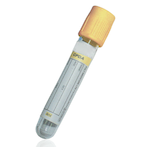BNP (NT pro-BNP (Brain Natriuretic Peptide)
Specimen Volume
1mL blood (~250uL serum)Turnaround Time
1 WeekSample Processing In Laboratory
No special requirementsSample Stability
6 days at 2-8°CGeneral Information
In subjects with left ventricular dysfunction, serum and plasma concentrations of BNP increase, as does the concentration of the putatively inactive amino-terminal fragment, NT-proBNP. ProBNP, comprising 108 amino acids, is secreted mainly by the ventricle and, in this process, is cleaved into physiologically active BNP (77-108) and the N-terminal fragment NT-proBNP. Studies indicate that NT-proBNP can be used in diagnostic and prognostic applications. The concentration of NT-proBNP in serum or plasma correlates with the prognosis of the left ventricular dysfunction. Changes in NT-proBNP concentration can be used to evaluate the success of treatment in patients with left ventricular dysfunction. In addition NT-proBNP is suitable for use in assessing vascular remodelling, and therefore contributes to the establishment of individualized rehabilitation procedures.
Patient Preparation
No special patient preparation required. Sample must only be collected into a yellow top vacutainer.
Notes
N-Terminal pro brain natriuretic peptide
Reference Range
Males <60yrs : <85ng/L
Male ≥60yrs: <161ng/L
Female < 60yrs: <144ng/L
Female ≥ 60yrs: <203ng/L
Heart failure referral guidelines (NICE):
<400 ng/L: do not refer
400-2000 ng/L: Refer within 6 weeks
>2000 ng/L: Refer urgently (<2 weeks)
Source of Reference Range
In house validation and NICE referral guidanceSpecifications
- EQA Status: UK NEQAS cardiac markers scheme
- EQAS Scheme: Yes








